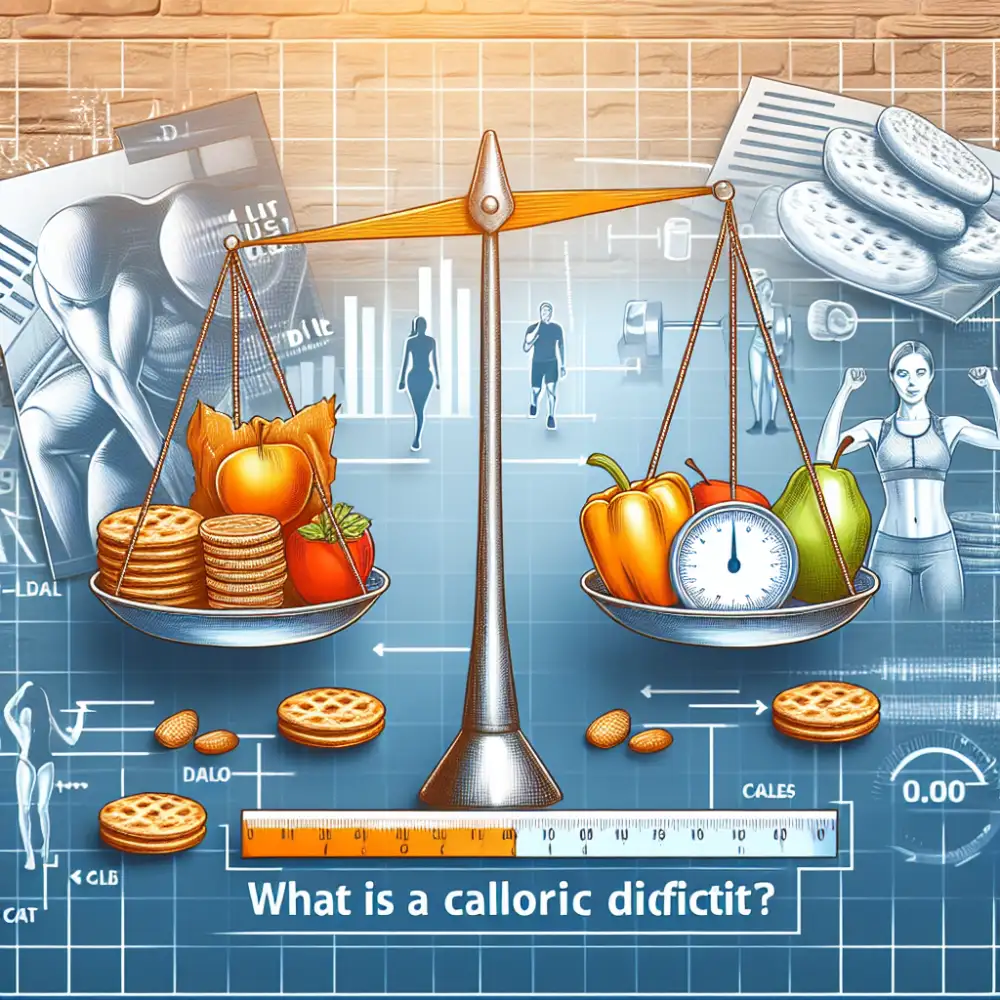Unlocking the Power of Caloric Deficit: Understanding the Key to Healthy Weight Loss

In today's world, where obesity rates are on the rise and weight loss is a common goal for many, understanding the concept of a caloric deficit is crucial. A caloric deficit refers to consuming fewer calories than your body needs to maintain its current weight. This article aims to unlock the power of caloric deficit and shed light on its role in achieving healthy weight loss. By understanding the science behind it and implementing effective strategies, you can embark on a flavorful journey towards a healthier you.
Definition of a caloric deficit
A caloric deficit occurs when the number of calories consumed is lower than the number of calories burned by the body. In simple terms, it means that you are consuming fewer calories than your body needs to maintain its current weight. This creates an energy imbalance, forcing the body to tap into stored fat for fuel. By consistently maintaining a caloric deficit over time, weight loss can be achieved. It is important to note that a moderate caloric deficit is recommended for sustainable and healthy weight loss.
Understanding energy balance
Understanding energy balance is crucial when it comes to achieving a caloric deficit for weight loss. Energy balance refers to the relationship between the calories consumed through food and the calories burned through physical activity and bodily functions. When you consume more calories than your body needs, the excess energy is stored as fat, leading to weight gain. On the other hand, when you consume fewer calories than your body needs, it must tap into its fat stores to make up for the energy deficit, resulting in weight loss. By understanding this concept, you can effectively manipulate your calorie intake and expenditure to create a caloric deficit and achieve your weight loss goals.
Importance of a caloric deficit for weight loss
The importance of a caloric deficit for weight loss cannot be overstated. When the body is in a state of caloric deficit, it is forced to tap into its stored energy reserves, which are primarily in the form of fat. This leads to a gradual and sustainable reduction in body weight over time. Numerous studies have shown that creating a caloric deficit is the most effective way to lose weight and improve overall health. It is important to note that a moderate caloric deficit is recommended, as extreme deficits can lead to muscle loss and other adverse effects.
How a caloric deficit is achieved
To achieve a caloric deficit, one must consume fewer calories than their body needs to maintain its current weight. This can be done by either reducing calorie intake through portion control or choosing lower-calorie food options. Additionally, increasing physical activity levels can also contribute to creating a caloric deficit. By burning more calories through exercise, the body will require more energy and tap into its stored fat reserves for fuel. It is important to note that creating a moderate caloric deficit of around 500-1000 calories per day is generally considered safe and sustainable for healthy weight loss.

| Feature | Caloric Deficit | Caloric Maintenance | Caloric Surplus |
|---|---|---|---|
| Definition | Consuming fewer calories than your body burns. | Consuming the same number of calories as your body burns. | Consuming more calories than your body burns. |
| Effect on Weight | Leads to weight loss. | Maintains current weight. | Leads to weight gain. |
| Example Daily Intake (for a 2000 calorie maintenance level) | 1500-1800 calories | 2000 calories | 2200-2500 calories |
Benefits of a caloric deficit
1. Weight loss: The primary benefit of a caloric deficit is that it promotes weight loss. When the body consistently burns more calories than it consumes, it taps into stored fat for energy, leading to gradual and sustainable weight loss over time.
2. Improved overall health: Losing excess weight through a caloric deficit can have numerous positive effects on overall health. It can reduce the risk of chronic diseases such as heart disease, type 2 diabetes, and certain types of cancer.
3. Increased energy levels: Contrary to popular belief, a caloric deficit does not necessarily lead to decreased energy levels. In fact, when the body starts utilizing stored fat for fuel, it can actually result in increased energy levels and improved mental clarity.
4. Enhanced physical performance: Shedding excess weight through a caloric deficit can improve physical performance by reducing strain on joints and muscles. This can lead to increased stamina, endurance, and agility during exercise or daily activities.
5. Boosted self-confidence: Successfully achieving weight loss goals through a caloric deficit can significantly boost self-confidence and improve body image. This newfound confidence often translates into other areas of life, leading to an overall improvement in well-being.
It's important to note that while there are numerous benefits associated with a caloric deficit, it is crucial to approach weight loss in a healthy and sustainable manner. Consulting with a healthcare professional or registered dietitian is recommended before embarking on any significant dietary changes or calorie restriction plans.
Potential risks and considerations
While a caloric deficit can be an effective strategy for weight loss, it is important to approach it with caution and consider potential risks. Severely restricting calorie intake can lead to nutrient deficiencies, as the body may not be receiving all the necessary vitamins, minerals, and macronutrients. This can result in fatigue, weakness, and compromised immune function.

Additionally, a prolonged caloric deficit can slow down metabolism as the body adapts to conserve energy. This can make it harder to continue losing weight over time. It is also important to note that extreme calorie restriction may lead to muscle loss instead of fat loss.
Furthermore, individuals with certain medical conditions such as diabetes or eating disorders should consult with a healthcare professional before attempting a caloric deficit. They may require personalized guidance and monitoring to ensure their health is not compromised.
To mitigate these risks, it is recommended to create a moderate caloric deficit rather than an extreme one. Aim for a gradual weight loss of 1-2 pounds per week by reducing daily calorie intake by 500-1000 calories. This approach allows for sustainable weight loss while still providing the body with essential nutrients.
Remember that maintaining a balanced diet rich in fruits, vegetables, lean proteins, whole grains, and healthy fats is crucial even when in a caloric deficit. Regular exercise should also be incorporated to support overall health and preserve muscle mass.
Always listen to your body's cues and adjust your approach if you experience any negative side effects. It is essential to prioritize your health throughout your weight loss journey.
Tips for creating a caloric deficit
1. Track your calorie intake: Use a food diary or mobile app to record everything you eat and drink. This will help you become aware of your eating habits and identify areas where you can cut back.
2. Choose nutrient-dense foods: Opt for whole, unprocessed foods that are rich in nutrients but lower in calories. Fruits, vegetables, lean proteins, and whole grains should form the basis of your diet.
3. Portion control: Be mindful of portion sizes to avoid overeating. Use smaller plates and bowls to visually trick yourself into thinking you're consuming more than you actually are.
4. Increase physical activity: Regular exercise not only burns calories but also boosts metabolism, making it easier to maintain a caloric deficit. Aim for at least 150 minutes of moderate-intensity exercise per week.
5. Limit liquid calories: Beverages like soda, juice, and alcohol can be high in calories without providing much nutritional value. Opt for water, unsweetened tea, or black coffee instead.
6. Practice mindful eating: Slow down while eating and pay attention to hunger and fullness cues. This can prevent mindless snacking and help you recognize when you're satisfied rather than stuffed.

7. Plan meals ahead: Prepare healthy meals and snacks in advance to avoid impulsive food choices when hunger strikes. Having nutritious options readily available makes it easier to stick to your caloric deficit plan.
Remember that creating a caloric deficit should be done gradually and with guidance from a healthcare professional if needed. It's important to prioritize overall health and well-being while aiming for sustainable weight loss goals.
In conclusion, understanding and utilizing the power of a caloric deficit is essential for healthy weight loss. By creating an energy imbalance where you consume fewer calories than you burn, you can effectively shed excess pounds. This approach not only promotes fat loss but also encourages sustainable lifestyle changes. However, it's crucial to approach a caloric deficit with caution and ensure that it is done in a balanced and safe manner. Remember to consult with a healthcare professional or registered dietitian before embarking on any weight loss journey. With proper guidance and adherence to healthy habits, unlocking the potential of a caloric deficit can lead to long-term success in achieving your weight loss goals.
Published: 17. 02. 2024
Category: Health



